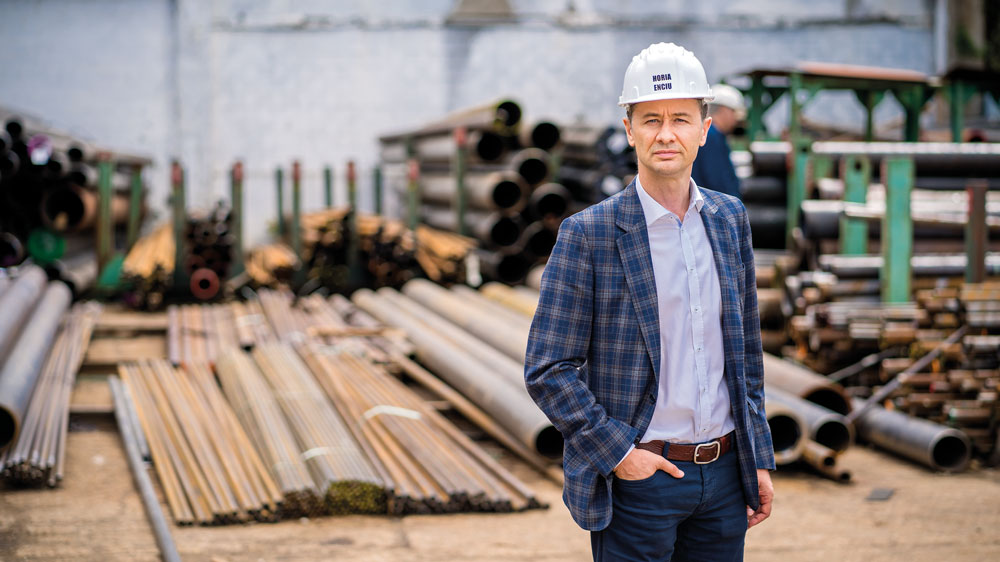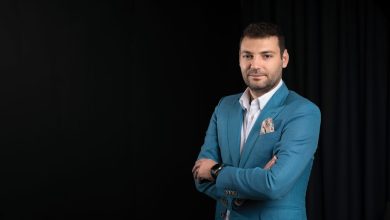Horia Enciu – GM, UPRUC-CTR, on Strategic Development Directions for the Coming Years
UPRUC-CTR SA Fagaras, a privately held company, established in 1999, carries on the tradition of more than 40 years in the production of a wide range of welding steel fittings and pressure vessels.
The products are used in installations and equipment in industries such as: refining, chemical and petrochemical, power plants, transport and distribution of natural gas, hot and cold water distribution networks, food and shipbuilding.
Horia Enciu, UPRUC-CTR SA Fagaras General Manager, discusses future projects and plans, as well as the company’s strategic development directions for the coming years.
A former student of the German High School “Goethe” in Bucharest and a graduate of university education in Economics, Horia Enciu has an experience of over 20 years in sales in the field of equipment for oil and gas pipelines and installations.
UPRUC-CTR SA Fagaras, data and figures
Where does the name of the company come from and how was it born?
Horia Enciu: The parent company, ‘Uzina de Prototipuri Reparatii Utilaje pentru Industria Chimica’ (Plant for Prototypes, Repairs and Equipment for the Chemical Industry), abbreviated UPRUC, was established in 1977 to support the development of the chemical and power industries. Back then some other major projects were planned in the chemical industry, besides the project of the first nuclear reactor of the Cernavoda Nuclear Power Plant. In 1999, the government decided to divide UPRUC into six companies, each preserving the know-how and personnel specific to one product type only. Thus, UPRUC-CTR SA was established, CTR coming from ‘Coturi, Teuri, Reductii’ (Elbows, Tees, Reducers). In the 2000s, all the six companies were privatized; in the last six years I have purchased shares in the company from those who got them from the government.
What is the field of activity of the company you run and what are the targeted industries?
Horia Enciu: We have two main products: fittings and pressure vessels, all made of steel.
Since its establishment we have been producing steel fittings – elbows, tees, reducers and caps. We process carbon steel, alloy steel and stainless steel, for both activities. Our competencies are in the field of products for demanding installations, with high quality requirements and for which the origin of the product matters and indicates a high quality level. In thermal power plants, where the fluids circulate under pressure and at high temperatures, in refineries, where expectations are high, in gas compressor stations where a high pressure is involved. These are the areas we are trained for. The certifications we possess, the approvals of the final customers, who put us on their Approved Manufacturer List (AML), are proof that the products made in Fagaras meet the quality requirements of the demanding markets.
In 2006 the company started to produce welded constructions and pressure vessels made of carbon steel, alloy steel and stainless steel for the oil and gas industry, for the shipbuilding industry and for other applications. This activity has a long tradition on the UPRUC platform in Fagaras, but following the split in the 2000s, it was taken over by another part of UPRUC.
What dedicated products and solutions do you offer for the energy sector? What tests can be performed in your own laboratory?
Horia Enciu: Our products, which I mentioned above are installed worldwide – from Houston, China and Scandinavia to South America or Singapore. Through our commercial partners we deliver to refineries, thermal power plants, installations in the chemical industry, wherever the demands are high and quality is a must.
Our mechanical testing laboratory has recently been certified according to ISO 17025:2018. This demonstrates our belief that we have to deliver top quality in order to face the competition and develop ourselves constantly for the next at least 42 years. This is what our customers expect and secures the jobs in Fagaras.
What are the figures for 2018 and what are the prospects for the next period?
Horia Enciu: We concluded 2018 with a turnover of about RON 43,000,000, 20% on top of 2017. On average we employ 285 colleagues who every day do their best to keep the tradition and know-how in Fagaras. Over the last three years we have seen signs of growth in the domestic market, after years when the EU sales, for both activities, accounted for about 80% of the turnover. While in 2016 the share of the EU sales was about 80%, in 2017 it decreased to approximately 73%, and in 2018 to 65%. In terms of procurement, we increased the share of domestic raw materials acquisitions, from 53% in 2016 to 60% in 2018. I see these figures as proof of recovery, after years of suffering, when the country lost a lot of know-how, industrial capacity, trust and knowledge. I was surprised a few years ago, during a meeting with companies which participated in the construction of the nuclear reactor No. 1 of the Cernavoda Nuclear Power Plant, to hear that Romanian companies met during trade fairs and exhibitions abroad and started to do business together, until then being only aware of the existence of the others on the principle “everything is in ruin”. Of course, a lot has been destroyed, many companies have imploded, but some have stubbornly fought back, developed and adapted to the 21st century and continued the tradition. After all, out of its 42 years of existence UPRUC-CTR SA was active only 12 in communism with the remaining 30 in capitalism…
Projects and plans for the future
What are the most important projects currently carried out by UPRUC CTR? What are your plans for the future regarding the consolidation/expansion of activity in the country and/or abroad?
Horia Enciu: Over the past few years we have delivered to all owners of refineries in Romania, for gas production, to transmission and distribution companies, as well as to other important projects abroad. We supplied fittings for the refurbishment of tanks, for furnaces, for coking, stripping, gas desulfurization and sulphur recovery, steam plants and many more. We supplied fittings for all the three compressor stations related to the BRUA project (Podisor, Bibesti and Jupa), pressure vessels for Jupa compressor station, and all fittings for the valve stations related to the BRUA pipeline.
On the global market, we supplied fittings to refineries and thermal power plants across the world, for technical gases installations, and for gas installations and stations.
We plan to increase production through better organization and simplification of processes. We need continuous increase in efficiency to improve our position in the global market.
Who are the UPRUC-CTR main business partners?
Horia Enciu: The main partners are our colleagues, the UPRUC-CTR SA employees. Without them and without their involvement, none of the things described above would be possible. When it comes to the external partners of the organization, the main customers in the EU market are the companies which sell fittings, those that contract complete deliveries of pipes, fittings, flanges and place orders for fittings with us. In Romania, the main partners for fittings are the owners of installations and pipelines and the contractors who work for them. For pressure vessels and welded components, the main customers are the domestic and international companies and contractors who place orders for components or complete installations. Our main export markets are Germany, The Netherlands, Austria and Poland. For the raw materials, our partners are domestic and international suppliers. As much as 99% of the raw materials are manufactured in the EU. For services, consumables, repairs and equipment we work with domestic suppliers.
What share of the investment budget is allocated for the modernization process and what works do you plan for 2019?
Horia Enciu: In recent years we have focused on restoring the initial capacity and upgrading the existing equipment, on workovers and refurbishment operations. We have devised a comprehensive program for reviewing and extending the TDVs (tools, devices, verifiers). For several years we have been planning maintenance in the summer months, usually at the end of July – the beginning of August. Besides this, thanks to the efforts of our colleagues in the maintenance department and our contractors, we manage to make workovers on the essential machinery, to upgrade and to automate them and to prepare them for a new life cycle. At the same time, we are in a process of rethinking the manufacturing flow, which will lead us to an even better organization and an increase in efficiency.
The road from ideas to opportunities and success
Which are the priority directions included in the company’s development strategy for the next period – market penetration, market development, product development, diversification, export?
Horia Enciu: Recently we have purchased a production hall and we want to double the surface area related to pressure vessels manufacturing. We see a future and very good prospects for the development of these products.
We are also in a continuous process of getting new approvals from end users, in order to allow our customers to keep in stock our goods for an even bigger number of end users.
What role does the team play in this regard?
Horia Enciu: Fortunately, the times when someone was doing and knew everything are gone! Nothing can be done without a team and I am constantly working on consolidating and increasing it. It is not easy, as it seems that the tradition of the Romanian industry is rather that of the providential man and less of the l team. The team, in the broad sense, must be the core of success and ensure consistency in the development of the organization.
Challenges?
Horia Enciu: YES! UPRUC-CTR SA is a member of The European committee of fittings manufacturers (in the EU), which is fighting for the preservation of this industry and to eliminate fraud. Unfortunately, in this industrial area, as in many others, there is the temptation of fraud made by changing the origin of the goods, declaring a different customs duty than the real one on border crossing to avoid the payment of customs or anti-dumping duties etc. Thus, products with dubious origin reach the market, which to an informed person are distinguishable from those with controlled origin by quality documentation and by price.
A recent case has been reported in Italy, where a network was unveiled, and I have also heard about a similar case in Romania, a few years ago.
Another challenge is the workforce. A few decades ago, there was a lot of discussion about the trades that would disappear, about the robots that would replace certain trades and here we are now unable to find the necessary skilled workforce. All Europe suffers from the lack of skilled workforce, not just Romania. I know about vocational schools in Romania which bring the students in their 9th grade from hundreds of kilometers away. Education is a main topic. I would like to see more efforts done in that area.
Process optimization is a huge challenge so we are focused on finding the proper solutions for our production, in terms of software and equipment.







